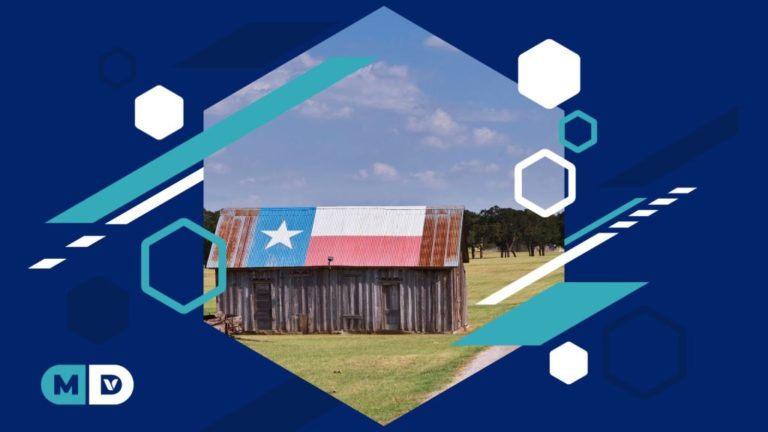
[ad_1]

Texas was one of the first US states to pass legislation criminalizing cannabis, and the state has maintained strict anti-cannabis policies through the present day. Texas is currently one of only 12 remaining US states where even medical cannabis products containing tetrahydrocannabinol (THC) have not gained legal status. To be frank, Texas’ stance on medical cannabis can be sort of confusing. This article will help clarify some of the complicated restrictions in place regarding cannabis legalization in the Lone Star State. In the following sections, we explore Texas’ laws regarding medical and recreational cannabis products as well as the varying decriminalization policies found across the state.
Medical Cannabis in Texas
In Texas, it is legal to purchase hemp-derived cannabidiol (CBD) products that contain no more than 0.3% THC. CBD comes from a breed of the cannabis sativa plant, known as hemp, that produces low levels of the psychoactive cannabinoid THC. In Texas, CBD products are available across the state for individuals who are looking to benefit from CBD’s medicinal properties, which include treating anxiety, inflammation, and epilepsy.
On the other hand, Texas laws surrounding THC products are more heavily restrictive. While THC is technically legal for certain eligible medical cannabis patients in Texas, the cannabinoid is only legal in very low doses and in certain products. Medical THC in Texas is only available in products meant to be swallowed, not smoked. Moreover, these low-dose THC derivatives must not exceed THC levels of 0.5% (which is almost as little THC as you would find in a CBD product). For comparison, states like California, Colorado, Washington, Maine, Massachusetts, and others typically offer products with THC levels of 15% or more.
Eligibility for medical THC products in Texas is dictated by the state’s Compassionate Use Program (CUP) laws. To access medical THC in Texas, a person must consult a physician registered with the Compassionate Use Registry of Texas who is certified to prescribe medical THC. Prescriptions for THC in Texas are only available to individuals with one or more of the following conditions:
- epilepsy
- seizure disorder
- multiple sclerosis
- spasticity
- amyotrophic lateral sclerosis
- autism
- cancer
- post-traumatic stress disorder (PTSD)
- incurable neurodegenerative disease
Is Cannabis Decriminalized in Texas?
The state of Texas delivers serious penalties to individuals who possess or sell cannabis. Possession of any amount under two ounces is a Class B misdemeanor, the second most severe non-felony crime in the state, which carries a sentence of up to 180 days in jail and a $2,000 fine.
It is also a crime to just own or sell paraphernalia in Texas, even if you aren’t using it. Although the criminality of paraphernalia is contingent upon whether you had “intent to use” the items, often the mere fact that these objects are commonly marketed for drug use can be used as evidence against you. Owning items used for growing, processing, storing, or using cannabis—e.g. cannabis-specific fertilizers, a bong, a grinder, a pack of rolling papers, or common items that could be connected with drug use—will result in being charged with a Class C misdemeanor, which carries a $500 fine, but no jail time. Selling paraphernalia, on the other hand, is a more severe Class A misdemeanor, which can put someone in jail for up to a year along with a $4,000 fine.
However, these penalties are not consistent across the entire state. In certain cities, like Austin and Dallas, police officers operate according to city-approved “cite-and-release” policies. Under these local policies, law enforcement authorities may cite or ticket someone for possessing a minor quantity of cannabis product, but the offender would be released rather than taken to jail for their violation.
In 2022, the voters of five cities in Texas passed local ordinances decriminalizing the possession of small amounts of cannabis. However, as of 2023, only three of these cities were able to implement the decision made by voters. Unfortunately, the City Councils of the other two cities voted down the decriminalization ordinances.
Most recently, in 2024, Texas Attorney General Ken Paxton moved to sue the cities in Texas that have passed decriminalization ordinances, stating that these policies violate Texas state laws. Paxton claims that the “pro-crime extremists” of the cities of Austin, San Marcos, Killeen, Elgin, and Denton have failed to comply with the State Constitution by adopting ordinances that are inconsistent with the laws enacted by the Texas Legislature. Despite the fact that these ordinances passed with overwhelming majorities, Paxton’s lawsuit could serve to undermine the interests of voters by blocking the implementation of decriminalization ordinances that were widely supported by the citizens of the five municipalities targeted.
Texas and Cannabis: the Main Things You Need to Know
The Lone Star State has had a fraught and divisive relationship with cannabis over the past century. Texas’ various legal restrictions, severe penalties, and currently uncertain future for decriminalization can make it difficult to get a clear idea of what is and isn’t allowed. Whether you are living in Texas or just passing through, knowing these main points can guide you to a better understanding of cannabis laws in the state:
- Is CBD legal?: Yes, hemp-derived CBD oil products are legal and sold throughout the state.
- Is THC legal?: Not recreationally, and sort of medically (but not really). Recreational cannabis has not been legalized in the state, and there are severe consequences across most of Texas for possessing even small amounts of non-medical THC-containing cannabis products. Medical patients with certain disorders may be prescribed oral route THC products at very low doses.
What is the Status of Decriminalization?
It is a crime to possess, grow, distribute, use, or sell cannabis in the state of Texas, but there are five cities in Texas that have passed municipal ordinances decriminalizing the possession of small amounts of non-medical cannabis. However, recent action by the Texas Attorney General may serve to block these decriminalization movements.
[ad_2]
Source link